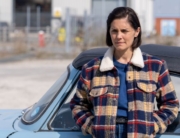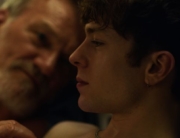Claire Danes and Jim Parsons star in this mature family film that centers on a young couple going through the astronomically competitive process of trying to get a child into a good kindergarten in Manhattan. In the midst of the grown-ups’ hair pulling, the child’s preschool teacher, Judy (Octavia Spencer), suggests to the parents that on Jake’s applications, they play the “card:” Jake happens to exhibit “gender expansive” behavior. Namely, Jake is fixated on Disney princesses. Is it too early to put a label on Jake, or should the folks exploit what could be a phase in order to secure their child a place in a top-tier school?
That’s such an awesome, timely premise. Two films remind me of such a story line: Gifted (also with Spencer) and Little Men. Both dealt with the issue of how to deal with exceptional children. Gifted was about whether a child savant should attend public school to become socialized among her peers. Little Men dealt in part with two yuppie parents who understood their early teenage son was gay and artistically gifted and therefore kept him at a distance from more typical boys his age to shield him from heartbreak. What A Kid Like Jake presents is a young professional couple trying so hard to do the right thing that they practically end up arguing themselves into immobility.
Alex and Greg’s marriage is young, their child is even younger. Can anyone really say definitively whether Jake, at four years old, is transgender or gender nonconforming just because the kid knows all the princess movies by heart and likes to dress up like them? That is such a major decision to make, and because of the contemporary culture the parents live in and the schools and community they are trying to become part of, they are being forced to make that decision when neither of them feels ready.
The film brings up a lot of great questions to which there are no real right answers. The quagmire of Alex, Greg, and Jake’s situation is certainly felt, but the film doesn’t really pay off. This is at no fault of Danes, who is in her wheelhouse playing Alex, a hysterical, controlling type who takes Jake’s school application to a more severe level than is healthy for her. No one will ever make the mistake of calling Parsons a commanding leading man. Greg is supposed to be am impassive therapist failing at both his marriage and career because of his passivity, but when he does finally stand up for himself against Alex, it’s not convincing.
The film is really talky. There’s no real action. Every scene is just characters talking, though in different settings (apartments, schoolrooms, restaurants; there is even a walking-and-talking scene set in a Halloween costume shop to spice things up). Because every scene features the same conversation carried over, many viewers at a certain point will stop and realize: This was totally adapted from play. And sure enough when the end credits roll, they’ll see the telltale “Adapted from the play by Daniel Pearle.”
The problem with adapting plays into movies is sometimes they hug too tightly to the source material and don’t adapt to the new medium. Because Jake, the titular 4-year-old, spends most of the film off-screen, his actions, dialogue, and traits are described by others rather than seen. It rings so clear that screenwriter Pearle never included Jake onstage in his play and, for the adaptation, didn’t bother bringing the child into the light, giving him things to do, and thereby making the audience understand the parents’ predicament better. Instead Pearle keeps the focus on Jake’s annoying folks, who constantly vouch for how special he is. All he had to do was watch the above-mentioned Gifted or Little Man Tate or Billy Elliot and take a few notes to create a memorable, unique young person.

















Leave A Comment